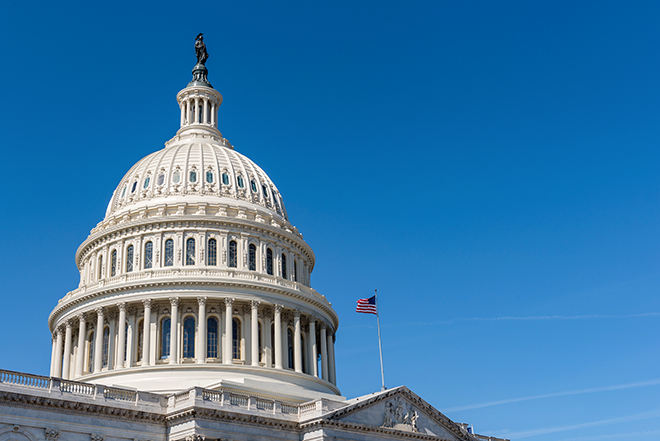Featured Topics
Featured Products
Events
S&P Global Offerings
Featured Topics
Featured Products
Events
S&P Global Offerings
Featured Topics
Featured Products
Events
S&P Global Offerings
Featured Topics
Featured Products
Events
Financial and Market intelligence
Fundamental & Alternative Datasets
Government & Defense
Banking & Capital Markets
Economy & Finance
Energy Transition & Sustainability
Technology & Innovation
Podcasts & Newsletters
Financial and Market intelligence
Fundamental & Alternative Datasets
Government & Defense
Banking & Capital Markets
Economy & Finance
Energy Transition & Sustainability
Technology & Innovation
Podcasts & Newsletters
31 Jan, 2025
By Karin Rives

| With a full majority in the US Congress, Republican lawmakers are poised to join the campaign against financial firms that they say are politicizing investments. |
Wyoming lawmakers hope to pass a bill in coming days that would prohibit asset managers from considering "political or ideological interests" when making investments for the state.
The Wyoming measure, H.B. 80, is among 48 bills targeting environmental, social and governance (ESG) investment criteria that lawmakers have introduced or pre-filed in 18 states since the 2025 legislative session began, according to the consulting firm Pleiades Strategy.
And with the US Congress and White House now in the hands of conservatives, the anti-ESG movement is likely entering a new era, said Connor Gibson, a senior adviser to Pleiades Strategy who maintains the firm's data on statehouse actions.
"It looks like we're going in the direction of federal legislation now, with US senators talking about holding a hearing on de-banking and President Trump going after Bank of America," Gibson said in an interview. "Clearly this is a culture war issue they're going to be moving on."
Speaking to the World Economic Forum on Jan. 23, Trump accused Bank of America Corp. and JPMorgan Chase & Co. of refusing to provide banking services to conservatives. The US Senate Committee on Banking, Housing and Urban Affairs has called a Feb. 5 hearing to investigate "the real impacts of de-banking in America."
The term ESG was mentioned 40 times in Project 2025, the policy mandate penned by conservatives for the next Republican president. Because some of the project's most prominent participants are expected to join Trump's administration, "it is a certainty that in at least some respects, Trump 2.0 policy will be aligned with the mandate," attorneys with Ropes & Gray wrote in a Jan. 30 update to asset manager clients.
"There is probably more alignment around ESG-related topics than many other portions of the mandate," the note said.
Ropes & Gray predicted that another wave of bills will be introduced in this Congress focused on climate, corporate disclosures, pension fund investments, and the hot-button issue of diversity, equity and inclusion (DEI).
Mixed results; states press on
States have attempted to hold financial firms liable for certain investment practices over the past four years, with mixed results. Some anti-ESG laws included loopholes that kept money manager contracts intact or were struck down by courts, while others caused states to sever ties with blacklisted firms. Some states also revised their bills once the projected economic fallout of their legislation brought opposition, as was the case with Wyoming.
The Wyoming bill, introduced by the state's Trump-friendly Freedom Caucus, initially allowed the state attorney general to sue financial firms over ESG policies. Wyoming Treasurer Curtis Meier, himself an ESG opponent, and officials with the $10 billion Wyoming Retirement System (WRS) warned lawmakers that the bill would drive financial firms out of the state, leave state agencies with fewer and less competitive money managers, and cost state pensioners $1.16 billion over three years.
After an uproar over how the legislation would affect retirement checks, lawmakers amended the bill to eliminate the penalty clause.
"The harmful provisions in the original [bill] were indeed amended out and the financial danger to the pension fund is thus avoided," Kristin Kasper, a spokesperson for the state retirement system, said in an email. "The WRS board appreciates that our concerns were heard."
Between 2021 and 2024, Republican lawmakers in 40 states introduced 392 bills seeking to use state contracting and their financial power to steer money manager investments away from investments deemed harmful to fossil fuel industries or conservative social values, according to a report Pleiades Strategy released Jan. 30.
Only 44 of the bills passed, but the legislative movement has had a broad chilling effect, observers said. US financial firms and banks fled industry networks focused on decarbonization while dialing back support for climate-related shareholder resolutions.
Even so, Republican attorneys general from 11 states on Jan. 23 sent letters to the largest US financial firms criticizing their continued climate policies after the companies left the Net Zero Banking Alliance and other networks.
"Some of you have made public statements of continued, independent commitment to the net-zero agenda," the letter said. "These actions raise serious concerns as to whether your exodus is an optics-only effort."